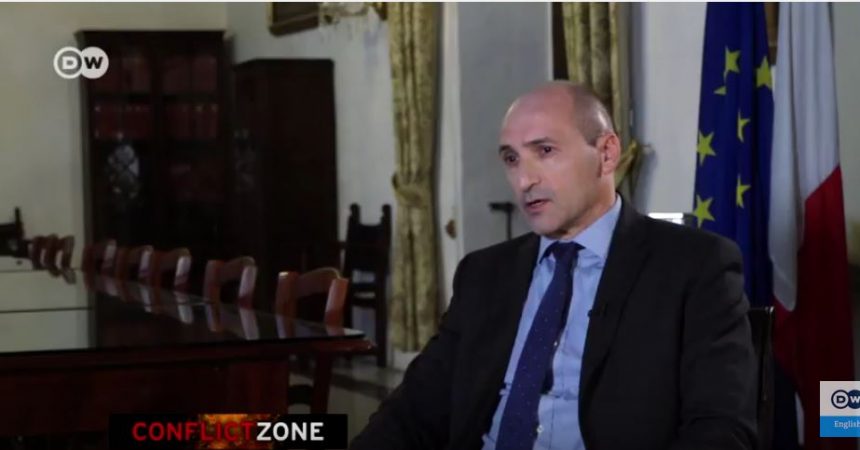Deputy Prime Minister Chris Fearne distanced himself from the controversial privatisation of hospitals with Vitals Global Healthcare saying he was not the one to sign the agreement in an interview with Deutsche Welle in which the government’s handling of corruption allegations and Daphne Caruana Galizia’s assassination was scrutinised.
Tim Sebastian put to Chris Fearne a question by Caruana Galizia last August, when she asked why the Health Minister had failed to enquire why the government had signed what she called “a shady deal for public hospital management with an untested new outfit called Vitals Global Healthcare”.
Fearne’s reply: “I didn’t sign that deal myself”.
Sebastian reminded him he formed part of the government, and asked whether there were no companies that had actual experience running hospitals that the government could find before signing this deal. Fearne replied it was a tender.
Sebastian continued to express disbelief that a hugely valuable contract of €2 billion did not get awarded to companies with a solid track record in hospital management.
An EU survey said 69% of Maltese businesses thought corruption was widespread in public procurement.
“I did not sign this deal myself…the government did, just to make that clear,” Fearne replied. He said the hospitals project was ongoing and referred to Barts Medical School that “started the course for first year medical students training on the island”.
Fearne did not elaborate on the problems related to the hospitals project, except for saying “the hospital are running”. Also, he did not tell DW that the students at Barts Medical School fell far short of what he had promised last January, when he had said the number of foreign students interested in studying at Barts medical school in Gozo had increased to 1,500.
The Shift revealed yesterday that only 42 students had enrolled in Barts Medical School.
Sebastian questioned why the government chose to redact significant parts of the agreement with Vitals. Fearne cited “commercial sensitivity,” in line with the government’s stand not to release the full agreements on any of the major deals signed by the government on national assets.
When pressed on the assassination of Caruana Galizia and the rule of law in the country, Fearne kept insisting that “barely six weeks after her murder…people were being arraigned in court.” This was countered by Sebastian questioning whether the government really believed these were the minds behind the murder. The Deputy Prime Minister kept saying everyone “must wait and see”.
“But you’re not pretending that even if these three were convicted…you’re not going to tell me that these three are the whole story? That you have solved the crime? ” Sebastian pressed the Deputy Prime Minister, while Fearne kept insisting on waiting for the outcome from the courts.
Sebastian also took Fearne to task on why Prime Minister Joseph Muscat had not sacked his Chief of Staff Keith Schembri and Minister Konrad Mizzi after they were exposed in the Panama Papers. He quoted Muscat saying last May that, “under normal circumstances they would have had to resign but I needed them to implement certain projects…I put the country first for them to deliver on the power station and other things”.
Sebastian said, “brazen isn’t it…the Prime Minister kept on close friends of his”.
When the Deputy Prime Minister replied that nobody was above the rule of law in Malta, Sebastian countered, “except these two”.
“The public is expected to accept that the Prime Minister’s friendship with these two is of no consequence whatsover…what we have is a clear breach of Cabinet rules and tax rules suddenly explained away as the best thing for the country by keeping these people on,” Sebastian said.
Fearne replied they are being investigated by a magistrate, which is not entirely correct. Magistrates are conducting criminal inquiries on whether the police should investigate allegations against Mizzi, Schembri and the Prime Minister’s wife Michelle Muscat after the police failed to do their duty and investigate conclusions drawn by Malta’s anti-money laundering agency, the FIAU.
“You make up the rules as you go along,” Sebastian countered. Fearne reacted by saying the rule of law demands you are investigated by the magistrate, not the media. Again, this is not correct because the first point of call is the police. The courts had to get involved after former Opposition Leader Simon Busuttil presented in court the findings that had been given to the police which they had ignored.
Sebastian pointed out the Prime Minister was the one to go to court with all the others involved in an attempt to “shut down” the inquiry into Mizzi and Schembri’s undeclared offshore accounts through an appeal. “If he wants to find the truth, why shut down the inquiry that should deliver it? He doesn’t want to know the truth, does he? Who, as Prime Minister, tries to shut down a court hearing that delivers the truth?”
“This is the permissive atmosphere in which you get killings of journalists,” Sebastian concluded.













